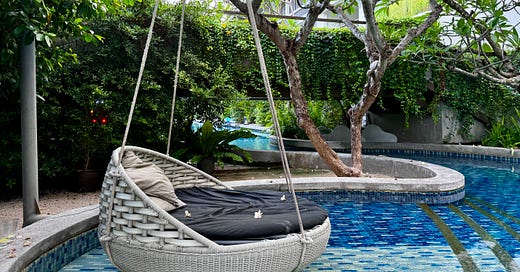“This hotel seems to get good reviews,” I said, scrolling through beach hotel listings, talking to my friend A. I was planning a trip to Thailand, where she lives, and we were choosing a resort for a beach getaway.
“Oh yeah, ignore those, they don't mean anything,” she said. “It’s illegal to post negative reviews in Thailand.”
I was confused. “Illegal?”
“Yeah, like you can go to jail for saying anything bad about a business, even if it’s true.”
Culturally, there’s context for this. By Thai law, people aren’t allowed to say anything bad about the monarch. (Though on that trip, I did hear some carefully coded shade thrown in the direction of the new king, who mostly lives in Germany and isn’t regarded as caring as deeply for the people as his father, the previous king, did.)
My favorite spot to nap at the hotel we chose, the Melia Koh Samui (Photo: Christine Sarkis)
Just like cultural norms are different around the world, so are reviews. These communication differences along with country-specific legislation—lawmakers in Italy, for instance, have drafted a law to ban anonymous reviews—mean that it can be difficult to take a review at face value. Though as was the case when I was looking at reviews in Thailand, it’s not always clear up front what sorts of cultural differences are in play when you’re casually scrolling through reviews.
But the whole experience got me thinking about how to choose anything when you’re going somewhere new. I know that user reviews are a deeply imperfect system for travel recommendations. I worked for a company owned by Tripadvisor for years and saw the constant effort the company put into battling fake reviews, and the reality that people with ulterior motives were always trying to find new ways around the screening.
Even in the city where I live, reading Yelp or Google reviews for local businesses requires more than a grain of salt. It’s a university town, and so the reviews are split between two worldviews: the students want inexpensive and abundant while permanent residents by and large are rating based on experience and food. What this means is that most things average out to an underwhelming 3.5 stars. Since I can’t ever really trust the star rating, I end up scrolling through pages of people’s highly individualized rants and raves.
And then there’s expert advice. As a travel journalist who has thought for two decades about the best ways to get trustworthy travel advice into the hands of travelers, I’ve got strong opinions. My job as a travel expert is to assess travel services, products, and places in a way that gives the most useful information to the maximum number of people. But I should never ever be the most interesting thing in a story because it’s not about me; it’s about the destination and the experience.
About a year ago, Google stopped surfacing search results for thousands of small and medium-sized online publications. Maybe you’ve noticed that if you Google, say, hotels in a certain destination, you’ll get a wall of sponsored search results, often a kinda-crappy AI answer, a bunch of Google Hotels listings, and then pages of hotel websites. Buried on page two or three (or six) are the stories that zoom out to offer third-party expert advice about standout hotels for families, or couples, or whatever.
There’s no one right way to plan travel, but I’m a firm believer in starting with curiosity, finding inspiration through research to dig into the possibility and richness of experience in a destination, and only then getting around to the booking nuts and bolts once you know where you actually want to be and what you want to see. Being routed directly from curiosity to commerce leaves little room for expansiveness, serendipity, and choice, not to mention factually correct advice.
Mixing formats makes up for the inherent shortcomings of each. User reviews and forums can be helpful, but they’re essentially always only about a single experience and sometimes have more to do with settling a score than sharing useful information. Though it’s pretty and fun, social media influencer content almost always privileges people over place and tends to lack that journalistic attention to objectivity. Expert advice fills in those gaps, and acts as a sturdy foundation for building trips. But as search result pages have become less informational and more about monetization, there’s less access to this foundation.
For the Thailand trip, I pivoted to just reading articles and asking friends for advice. My niece, mishearing the term “trust your gut,” once advised me to “trust my butt.” It’s sort of how I think about piecing together solid travel advice in a landscape that’s shifted to be less about connecting travelers with great ideas and more about maximizing monetization and keeping that money within the Googlesphere. Trusting my gut here means doing the extra work to skip the generic AI summary, scroll past the sponsored hard sells, know what I’m getting into when I look at reviews, and seek out trustworthy advice in my travel planning.
In the end, we chose a hotel on Koi Samui that had come up in an article and by personal recommendation. It was great and I’d recommend it, even under no legal threat. (Here’s my video walkthrough, if you’re interested.)



